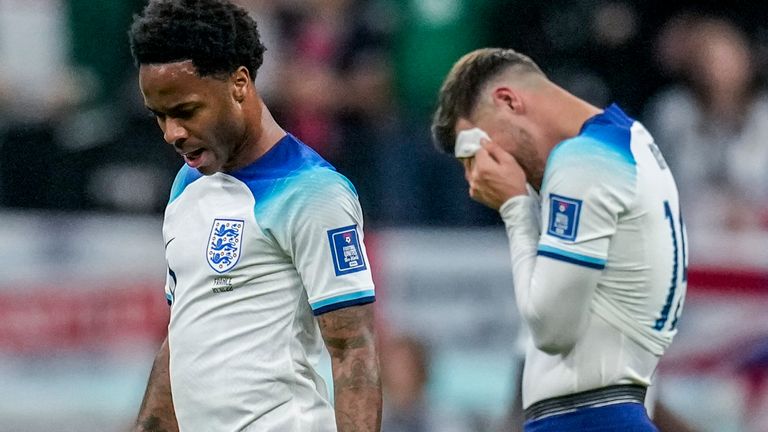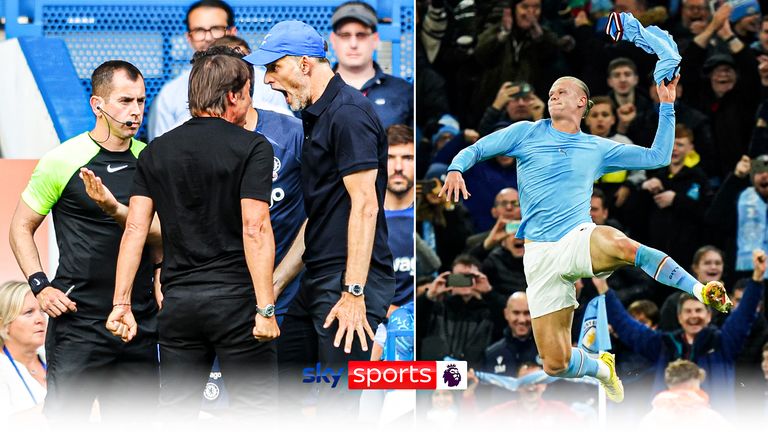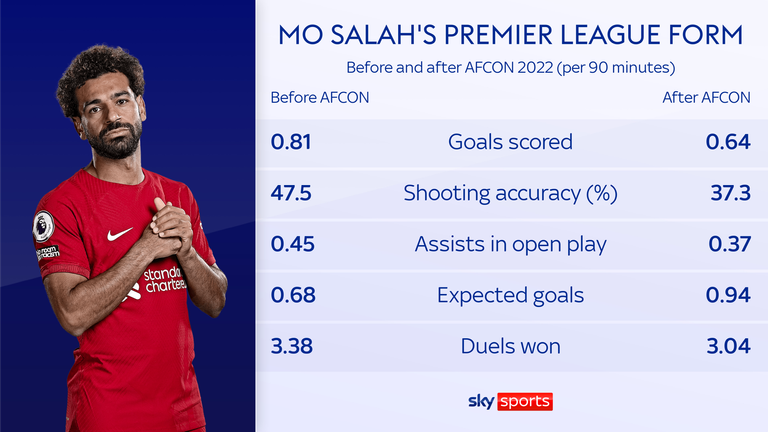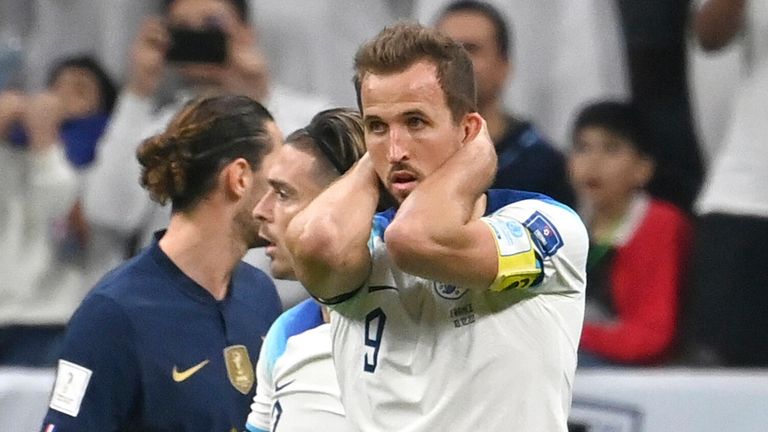Premier League returns: Why players face post-World Cup 'performance and confidence' issues this weekend
With the Premier League's return after the World Cup break, how will the top flight's representatives in Qatar - more than 100 - adapt to being thrust back into league action so soon after the tournament? Mark Bowden explains why issues go beyond fatigue and disappointment...
Monday 26 December 2022 13:32, UK
From the glory of the world stage, the potential to win a tournament in seven games and the significance of every match, returning to the bread and butter of the Premier League will hit some players hard this weekend.
There are the obvious factors. The intense schedule over the past month for those who reached the latter stages, the disappointment of failure in Qatar - for everyone except Argentina's world beaters.
Even before the tournament, barely a midweek went by without a game. The continental calendar has been squeezed. And now eight days after the World Cup final, the Premier League returns on Boxing Day.
- The Premier League returns: Where did we leave things?
- All the Premier League fixtures live on Sky Sports this winter
- Mid-season friendlies - how did PL teams prepare for the restart?
- Get Sky Sports | Download the Sky Sports App | Get NOW to stream biggest moments
Though fatigue has taken most of the headlines, perhaps the most significant issue is the one least appreciated.
Mental performance consultant Mark Bowden works with players across the footballing spectrum, including several at Champions League clubs.
He told Sky Sports Essential Football podcast readjusting to the cyclic marathon of the Premier League, from the instant gratification of the World Cup, will have a major effect on most of the division's 133 representatives in Qatar. And they won't even realise it.
"You'll hear buzzwords such as World Cup hangover, World Cup fatigue, but actually there's a real mental aspect in the brain having a physical impact," he said.
"Let's use Bukayo Saka as an example from England, but it could be anyone. If you think of his last game, the training sessions leading up to it. The reward for winning that game was a World Cup semi-final. That is very powerful, and it's very imminent.
"When we have an objective which is very powerful, we have a massive increase in the brain of a chemical called dopamine. That drives more natural determination, more focus in your game. It will improve your performances. And when it goes up, we get an increase in testosterone - which gives us more confidence, as well as strength and power.
"Now look at the next game he's got on Monday. You could say, 'well Arsenal are going to look to win the Premier League' - but that's a long, long way off. It's not going to happen against West Ham, it's not going to happen in the next five games.
"The problem Bukayo, and every other player will have this weekend, is that as professional as they might be, the draw of winning three points in a long season is just not the same.
"What will naturally happen in the brain and body is a reduction in dopamine and testosterone, which will equal a player having less drive and their determination, focus and performance levels will go down.
"The physical strength, intensity, confidence in their game - they'll be thinking, 'I'm trying, it's just not working'. They will experience a reduction in performance-enhancing chemicals through no fault of their own and no knowledge of their own."
Mid-season tournaments are nothing new to some. The African Cup of Nations took some of the Premier League's biggest names away for a month last January, though not in the same numbers as the World Cup.
Title winner Sadio Mane's form actually improved after he returned to Liverpool, though he had been accused of underperforming in the first half of the season.
But beaten finalist Mo Salah, who started 2021/22 like a freight train, could never quite reach those heights again following Egypt's defeat.
Boden feels Salah's experience is more likely to reflect the average Premier League players' response.
Sky Sports' Karen Carney recently told The Guardian the impact of a World Cup could take the rest of the season to shake off.
"I always felt it took me up to six months to recover mentally from playing in a major tournament but physically I had to jump pretty much straight into a league campaign," she wrote.
In Qatar, even the disappointment of England's quarter-final exit only spared them an additional week off.
Normally, they would get a summer to recharge, with the gradual excitement of a new season building over time. This year, they could be back on the pitch 15 days after their exit at the Al Bayt.
There is no way the disappointment can have faded. Interestingly, Bowden backs Harry Kane to shrug off his own guilt after his penalty miss against France. It won't be such a positive picture everywhere.
"There's going to be a crash, and that is that buzzword of the hangover," Bowden said. "You have a summer tournament and there'll still be a drop, but there's that distance to the next campaign, and the excitement about a new season.
"You've even got the weather. It's nice, warm weather, now they're coming back to the cold and wet when they've been over in the sunshine, which isn't an incentive. There's so many reasons why this World Cup is going to result in such a bigger drop in testosterone and dopamine than if it was held in the summer.
"The disappointment of a World Cup is how a player perceives it. They could have the weight of the world on their shoulders, or think the team performed pretty well and look at the positives.
"Harry Kane missed his second spot kick, yes, but I think we've seen how he's performed consistently across the last 10 years. I think he'll be as driven and focused as ever. He's had setbacks with things before and come back better.
"Whether he's worked with people on that or just has that understanding of how he ticks, he knows how to respond to things like this."
So what to do then? Should managers favour players who never travelled to Qatar for the next few games? Not necessarily, but a lack of attention to the psychology of performance, even in the best domestic league in the world, won't help.
In the same way Arsene Wenger turned nutrition into a focal point of the game, so too is a psychological revolution on the horizon at some stage. There have been hints down the years, with Sir Alex Ferguson using a sleep coach and a vision specialist to push his players towards the mental state he wanted.
But almost a decade since his retirement things have stalled. Players Bowden has worked with have often previously never seen a psychologist, even when one is available at their clubs.
Most pay out of their own pocket despite the clear advantages their teams gain from their improved performance.
"It baffles me why there isn't a much bigger emphasis on the psychological side, the mental side of the game," Bowden said. "Most players and a lot of managers can still see the mental side of the game as something fluffy, giving players well-being.
"But it's much more about the production of performance-enhancing or degrading chemicals in the brain.
"What could teams be doing? If we're going to compare like-for-like, in terms of helping that dopamine and natural testosterone to be released, you want each individual player to look for something that is a big driver for something imminent.
"So for something big for the next game, the next two games. Something that can really excite them to achieve things. We can hack some of this as well - with players I work with, there's a lot of things we get them doing on a consistent basis.
"One of those is whenever they have their morning shower, for the last 30 seconds turn it down to as cold as it can possibly be. That has far-reaching benefits, but naturally it also produces more dopamine.
"It might not be the like for like, but we're always looking for ways to tweak the brain, the drivers of performance. I'd imagine that's what these guys will be looking for this weekend."
Will that extra half a minute help the World Cup returnees, or will they look a shower themselves? We'll only find out, alongside their anxious managers, when they set foot on the pitch next week.








